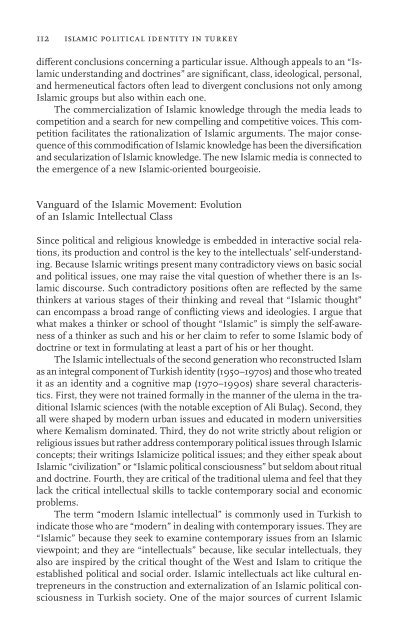You also want an ePaper? Increase the reach of your titles
YUMPU automatically turns print PDFs into web optimized ePapers that Google loves.
112 islamic political identity <strong>in</strong> turkeydiVerent conclusions concern<strong>in</strong>g a particular issue. Although appeals to an “<strong>Islamic</strong>understand<strong>in</strong>g and doctr<strong>in</strong>es” are signiWcant, class, ideological, personal,and hermeneutical factors often lead to divergent conclusions not only among<strong>Islamic</strong> groups but also with<strong>in</strong> each one.The commercialization of <strong>Islamic</strong> knowledge through the media leads tocompetition and a search for new compell<strong>in</strong>g and competitive voices. This competitionfacilitates the rationalization of <strong>Islamic</strong> arguments. The major consequenceof this commodiWcation of <strong>Islamic</strong> knowledge has been the diversiWcationand secularization of <strong>Islamic</strong> knowledge. The new <strong>Islamic</strong> media is connected tothe emergence of a new <strong>Islamic</strong>-oriented bourgeoisie.Vanguard of the <strong>Islamic</strong> Movement: Evolutionof an <strong>Islamic</strong> Intellectual ClassS<strong>in</strong>ce political and religious knowledge is embedded <strong>in</strong> <strong>in</strong>teractive social relations,its production and control is the key to the <strong>in</strong>tellectuals’ self-understand<strong>in</strong>g.Because <strong>Islamic</strong> writ<strong>in</strong>gs present many contradictory views on basic socialand political issues, one may raise the vital question of whether there is an <strong>Islamic</strong>discourse. Such contradictory positions often are reXected by the sameth<strong>in</strong>kers at various stages of their th<strong>in</strong>k<strong>in</strong>g and reveal that “<strong>Islamic</strong> thought”can encompass a broad range of conXict<strong>in</strong>g views and ideologies. I argue thatwhat makes a th<strong>in</strong>ker or school of thought “<strong>Islamic</strong>” is simply the self-awarenessof a th<strong>in</strong>ker as such and his or her claim to refer to some <strong>Islamic</strong> body ofdoctr<strong>in</strong>e or text <strong>in</strong> formulat<strong>in</strong>g at least a part of his or her thought.The <strong>Islamic</strong> <strong>in</strong>tellectuals of the second generation who reconstructed Islamas an <strong>in</strong>tegral component of Turkish identity (1950–1970s) and those who treatedit as an identity and a cognitive map (1970–1990s) share several characteristics.First, they were not tra<strong>in</strong>ed formally <strong>in</strong> the manner of the ulema <strong>in</strong> the traditional<strong>Islamic</strong> sciences (with the notable exception of Ali Bulaç). Second, theyall were shaped by modern urban issues and educated <strong>in</strong> modern universitieswhere Kemalism dom<strong>in</strong>ated. Third, they do not write strictly about religion orreligious issues but rather address contemporary political issues through <strong>Islamic</strong>concepts; their writ<strong>in</strong>gs <strong>Islamic</strong>ize political issues; and they either speak about<strong>Islamic</strong> “civilization” or “<strong>Islamic</strong> political consciousness” but seldom about ritualand doctr<strong>in</strong>e. Fourth, they are critical of the traditional ulema and feel that theylack the critical <strong>in</strong>tellectual skills to tackle contemporary social and economicproblems.The term “modern <strong>Islamic</strong> <strong>in</strong>tellectual” is commonly used <strong>in</strong> Turkish to<strong>in</strong>dicate those who are “modern” <strong>in</strong> deal<strong>in</strong>g with contemporary issues. They are“<strong>Islamic</strong>” because they seek to exam<strong>in</strong>e contemporary issues from an <strong>Islamic</strong>viewpo<strong>in</strong>t; and they are “<strong>in</strong>tellectuals” because, like secular <strong>in</strong>tellectuals, theyalso are <strong>in</strong>spired by the critical thought of the West and Islam to critique theestablished political and social order. <strong>Islamic</strong> <strong>in</strong>tellectuals act like cultural entrepreneurs<strong>in</strong> the construction and externalization of an <strong>Islamic</strong> political consciousness<strong>in</strong> Turkish society. One of the major sources of current <strong>Islamic</strong>




